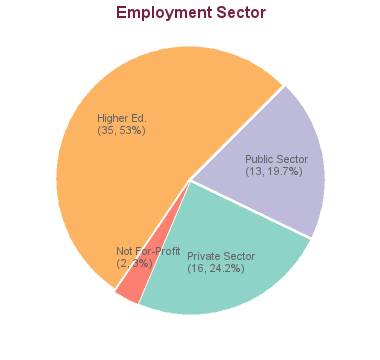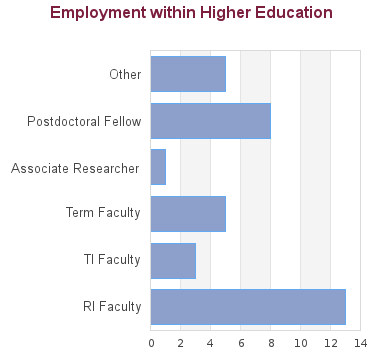
Rabia Mir
I did my Master's at UBC so continuing on for my PhD seemed like a natural next step. Also, my supervisors are at UBC and especially for doctoral programs, your supervisors and their expertise is critical to your research journey.

Review details about the recently announced changes to study and work permits that apply to master’s and doctoral degree students. Read more
The Interdisciplinary Studies Graduate Program (ISGP) at the University of British Columbia was established in 1971, the first of its kind in Canada. It is one of the only Canadian programs to offer doctoral degrees in interdisciplinary studies, and is possibly one of the largest of its kind in North America.
The main purpose of the ISGP is to enable qualified graduate students to pursue advanced interdisciplinary research exceeding the provisions of existing departmental programs. There are no restrictions regarding the topic and in many cases the student draws upon expertise from several distinct faculties. The prospective student has to bring together three or four qualified faculty from different departments or units. Because there are no constraints on which fields are brought together, there are virtually no two students in the same sub-field. The ISGP is designed only for a highly motivated and superb student who can steer an independent course.
ISGP gives you the opportunity to:
Please see ISGP website for complete list of required documents.
The Faculty of Graduate and Postdoctoral Studies establishes the minimum admission requirements common to all applicants, usually a minimum overall average in the B+ range (76% at UBC). The graduate program that you are applying to may have additional requirements. Please review the specific requirements for applicants with credentials from institutions in:
Each program may set higher academic minimum requirements. Please review the program website carefully to understand the program requirements. Meeting the minimum requirements does not guarantee admission as it is a competitive process.
Applicants from a university outside Canada in which English is not the primary language of instruction must provide results of an English language proficiency examination as part of their application. Tests must have been taken within the last 24 months at the time of submission of your application.
Minimum requirements for the two most common English language proficiency tests to apply to this program are listed below:
Overall score requirement: 90
Reading
22
Writing
21
Speaking
21
Listening
22
Overall score requirement: 6.5
Reading
6.0
Writing
6.0
Speaking
6.0
Listening
6.0
Some programs require additional test scores such as the Graduate Record Examination (GRE) or the Graduate Management Test (GMAT). The requirements for this program are:
The GRE is not required.
Please see ISGP website for complete list of required documents.
All applicants have to submit transcripts from all past post-secondary study. Document submission requirements depend on whether your institution of study is within Canada or outside of Canada.
A minimum of three references are required for application to graduate programs at UBC. References should be requested from individuals who are prepared to provide a report on your academic ability and qualifications.
Many programs require a statement of interest, sometimes called a "statement of intent", "description of research interests" or something similar.
Students in research-based programs usually require a faculty member to function as their thesis supervisor. Please follow the instructions provided by each program whether applicants should contact faculty members.
IMPORTANT: In order to ensure stability and appropriate level of support from your supervisory team, it is crucial that at least one of your proposed co-supervisors is a G+PS member who is tenured or tenure track faculty member holding the rank of Assistant/Associate/Full Professor (verify by entering name here).
Permanent Residents of Canada must provide a clear photocopy of both sides of the Permanent Resident card.
All applicants must complete an online application form and pay the application fee to be considered for admission to UBC.
| Fees | Canadian Citizen / Permanent Resident / Refugee / Diplomat | International |
|---|---|---|
| Application Fee | $116.25 | $168.25 |
| Tuition * | ||
| Installments per year | 3 | 3 |
| Tuition per installment | $1,875.34 | $3,294.66 |
| Tuition per year (plus annual increase, usually 2%-5%) | $5,626.02 | $9,883.98 |
| Int. Tuition Award (ITA) per year (if eligible) | $3,200.00 (-) | |
| Other Fees and Costs | ||
| Student Fees (yearly) | $1,144.10 (approx.) | |
| Costs of living | Estimate your costs of living with our interactive tool in order to start developing a financial plan for your graduate studies. | |
Applicants to UBC have access to a variety of funding options, including merit-based (i.e. based on your academic performance) and need-based (i.e. based on your financial situation) opportunities.
All full-time students in UBC-Vancouver PhD programs will be provided with a funding package of at least $24,000 for each of the first four years of their PhD from September 2024. The funding package may consist of any combination of internal or external awards, teaching-related work, research assistantships, and graduate academic assistantships. Please note that many graduate programs provide funding packages that are substantially greater than $24,000 per year. Please check with your prospective graduate program for specific details of the funding provided to its PhD students.
This results in a net balance (any funding provided to the student minus tuition and fees) mean of $23,227 and median of $21,495.
All applicants are encouraged to review the awards listing to identify potential opportunities to fund their graduate education. The database lists merit-based scholarships and awards and allows for filtering by various criteria, such as domestic vs. international or degree level.
Many professors are able to provide Research Assistantships (GRA) from their research grants to support full-time graduate students studying under their supervision. The duties constitute part of the student's graduate degree requirements. A Graduate Research Assistantship is considered a form of fellowship for a period of graduate study and is therefore not covered by a collective agreement. Stipends vary widely, and are dependent on the field of study and the type of research grant from which the assistantship is being funded.
Graduate programs may have Teaching Assistantships available for registered full-time graduate students. Full teaching assistantships involve 12 hours work per week in preparation, lecturing, or laboratory instruction although many graduate programs offer partial TA appointments at less than 12 hours per week. Teaching assistantship rates are set by collective bargaining between the University and the Teaching Assistants' Union.
Academic Assistantships are employment opportunities to perform work that is relevant to the university or to an individual faculty member, but not to support the student’s graduate research and thesis. Wages are considered regular earnings and when paid monthly, include vacation pay.
Canadian and US applicants may qualify for governmental loans to finance their studies. Please review eligibility and types of loans.
All students may be able to access private sector or bank loans.
Many foreign governments provide support to their citizens in pursuing education abroad. International applicants should check the various governmental resources in their home country, such as the Department of Education, for available scholarships.
The possibility to pursue work to supplement income may depend on the demands the program has on students. It should be carefully weighed if work leads to prolonged program durations or whether work placements can be meaningfully embedded into a program.
International students enrolled as full-time students with a valid study permit can work on campus for unlimited hours and work off-campus for no more than 24 hours a week during academic sessions.
A good starting point to explore student jobs is the UBC Work Learn program or a Co-Op placement.
Students with taxable income in Canada may be able to claim federal or provincial tax credits.
Canadian residents with RRSP accounts may be able to use the Lifelong Learning Plan (LLP) which allows students to withdraw amounts from their registered retirement savings plan (RRSPs) to finance full-time training or education for themselves or their partner.
Please review Filing taxes in Canada on the student services website for more information.
Applicants have access to the cost estimator to develop a financial plan that takes into account various income sources and expenses.
72 students graduated between 2005 and 2013. Of these, career information was obtained for 66 alumni (based on research conducted between Feb-May 2016):


Many employers are increasingly interested in hiring people with broader backgrounds than are provided by traditional programs. For example, in some academic settings, it is a real advantage to be versatile enough to teach in several areas and to interact with researchers across a broad spectrum of interests. The Faculty of Graduate and Postdoctoral Studies offers a wide range of seminars and workshops on professional development. The UBC Centre for Student Involvement and Careers provides support in helping students navigate career options.
These statistics show data for the Doctor of Philosophy in Interdisciplinary Studies (PhD). Data are separated for each degree program combination. You may view data for other degree options in the respective program profile.
| 2023 | 2022 | 2021 | 2020 | 2019 | |
|---|---|---|---|---|---|
| Applications | 25 | 24 | 30 | 22 | 36 |
| Offers | 13 | 9 | 9 | 12 | 14 |
| New Enrolment | 11 | 8 | 9 | 10 | 11 |
| Total Enrolment | 73 | 75 | 83 | 77 | 87 |
Students in research-based programs usually require a faculty member to function as their thesis supervisor. Please follow the instructions provided by each program whether applicants should contact faculty members.
IMPORTANT: In order to ensure stability and appropriate level of support from your supervisory team, it is crucial that at least one of your proposed co-supervisors is a G+PS member who is tenured or tenure track faculty member holding the rank of Assistant/Associate/Full Professor (verify by entering name here).
These videos contain some general advice from faculty across UBC on finding and reaching out to a supervisor. They are not program specific.
| Year | Citation |
|---|---|
| 2021 | Dr. Marjan Ebneshahidi examined how immigrant women experience residential neighbourhoods and what makes a neighbourhood more livable for them in multicultural cities. This research highlights the important role that the social and physical features of a neighbourhood play in shaping immigrant women's perceptions and experiences of neighbourhood livability. |
| 2021 | Dr. Schinnerl examined the nexus between education and immigration and the role of higher education institutions as both migration gatekeepers and community migration hubs. Her work deals with the influence of universities and colleges on immigration policy in Canada and what this means for future international student recruitment. |
| 2021 | Dr. Lefkowich designed and piloted methods for community-based digital storytelling. Using personal reflections, she illustrated how filmmakers and academics normalize, conceal, and defend racism and colonialism as best practices. To disrupt this pattern, she offered story strategies that encourage greater accountability, creativity, and bravery. |
| 2021 | Dr. Moon used comics as a theoretical and formal intervention to explore perspectival shifts between science and literature in early 20th-century Britain. Her format-bending research revealed how works by Arthur Eddington, James Jeans, Olaf Stapledon, and Virginia Woolf moved beyond singular, Earth-centered, and human-centered perspectives. |
| 2021 | Dr. Cole explored the transformative potential of public sector innovation labs in catalyzing change on complex social and environmental challenges. She worked with co-researchers from Canada and Europe, and developed theory and frameworks to strengthen the research and practices of public sector and social innovation labs. |
| 2021 | Utilizing an Indigenous Determinants of Health framework, Dr. Lebrun collaborated with Kanaka Maoli women leaders on Kaua'i on issues of food sovereignty, land tenure, and health. This research is being used to garner grants to establish a Food Sovereignty project on Hawaiian Homelands. |
| 2021 | Dr. Janet Currie examined the patient, clinician, socio-cultural and policy factors that have contributed to an increase in the off-label prescribing of domperidone to treat low breastmilk supply in BC. The research identifies approaches that can be used to improve the overall safety, effectiveness and transparency of off-label prescribing. |
| 2020 | Dr. Singh examined how modern European technology played a central role in colonizing Punjab. He showed that technology played such a central role that coloniality should be understood as techno-coloniality. He demonstrated that non-Western traditions, such as the Sikh spiritual tradition, can play a crucial role in building a decolonial future. |
| 2020 | Dr. Jafer explored politics of victimhood and agency in the everyday lives of a religious minority community in BC. She demonstrated that subtle acts of resistance, when motivated by religious convictions, create religio-political identities that insist on active citizenship and equal recognition, providing a new interpretation of victimhood. |
| 2020 | Dr. Byers explored how rat movement in cities influences rat-associated disease risks and how interactions with rats impact the mental health of residents. Her work reveals that rats have negative impacts on physical and psychological health, and that mitigation of these risks requires holistic One Health solutions. |
Interdisciplinary Studies allows students to design their own graduate program by bringing together three or four qualified faculty from different departments or units. Because there are no constraints on which fields are brought together, there are virtually no two students in the same subfield.
Departments/Programs may update graduate degree program details through the Faculty & Staff portal. To update contact details for application inquiries, please use this form.

From academic excellence and modern facilities to our diverse degree program listings to being named one of the “most innovative universities” by Reuters in 2019, UBC has a lot to offer.